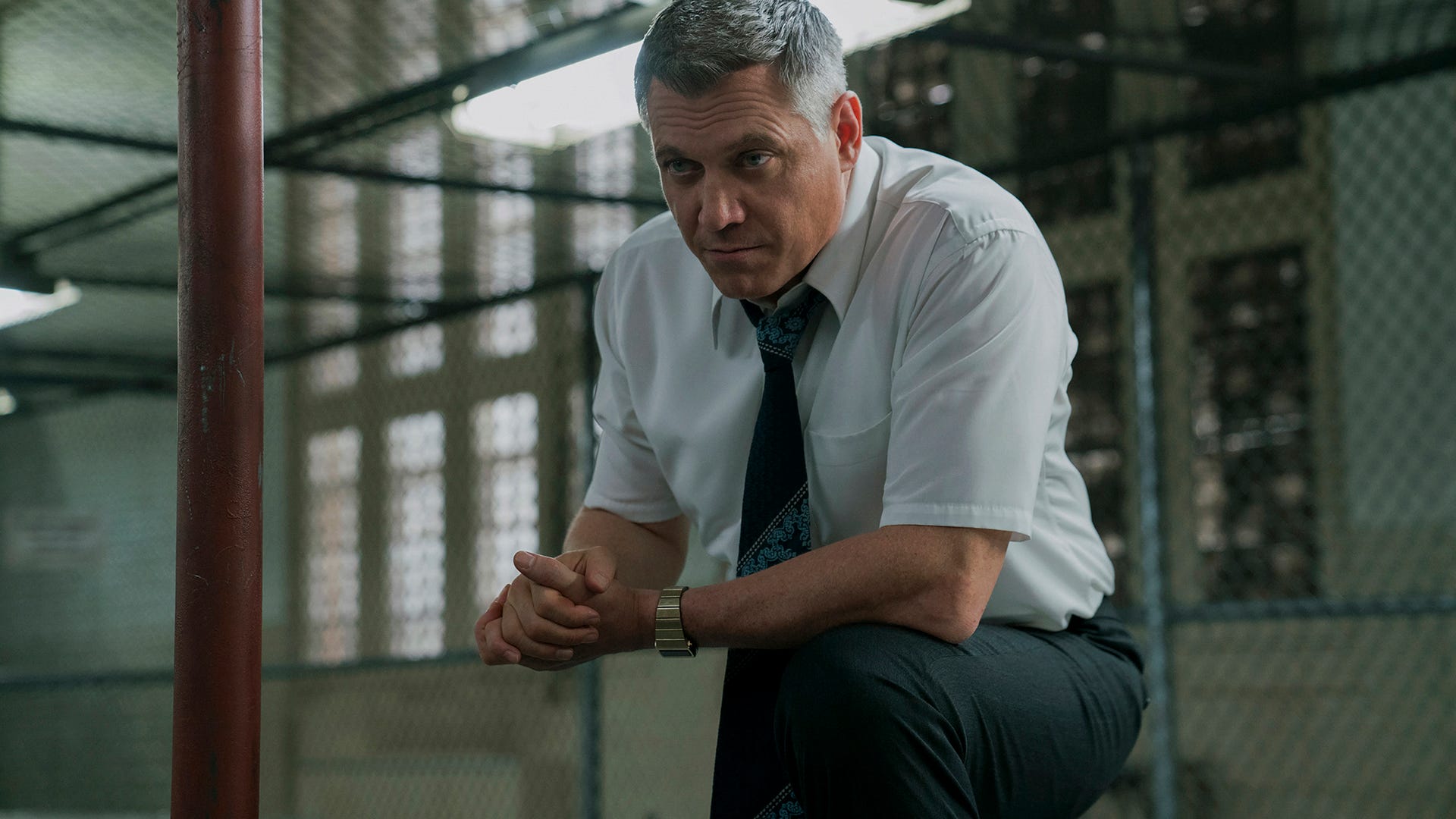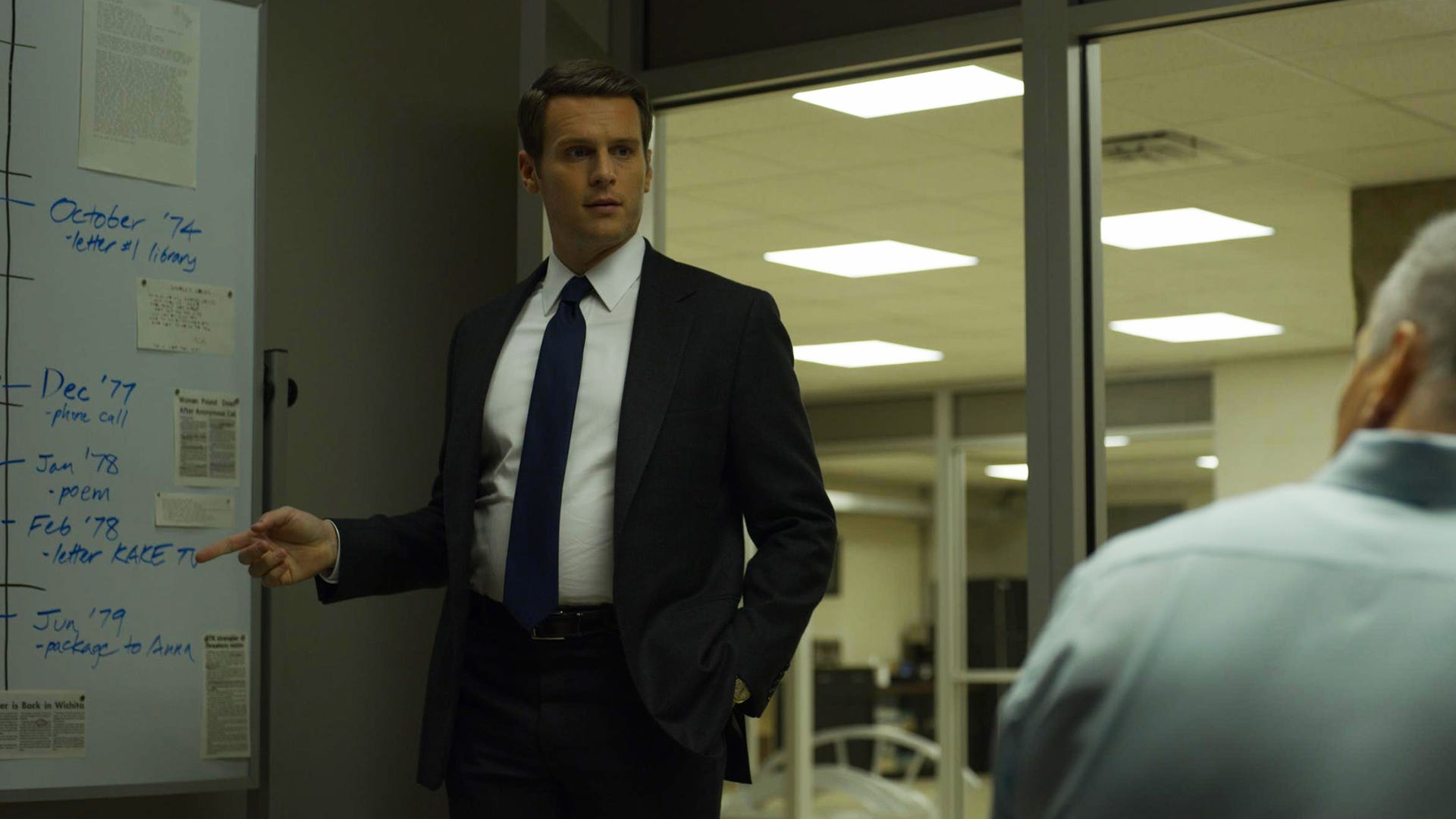Join or Sign In
Sign in to customize your TV listings
By joining TV Guide, you agree to our Terms of Use and acknowledge the data practices in our Privacy Policy.
Mindhunter Review: Why Season 2 Is So Killer
There's no sophomore slump for this calculated series
[Warning: The following contains spoilers for the full second season of Mindhunter. Read at your own risk!]
In Mindhunter's second season, passion must give way to productivity for the FBI's Behavioral Science Unit (BSU), and the show becomes an even more compelling character study as a result of these new pressures.
Joe Penhall's series, adapted from John Douglas' book of the same name and styled with producer David Fincher's razor-sharp precision, was already a welcome addition to the era of peak TV when it debuted in 2017. With its deliberate approach -- characters voice, rather than show, the level of the macabre they are grappling with -- the storytelling doesn't batter audiences with searing imagery or generic horror. But the show's remorseless butchers' tales are still so twisted that viewers are almost certainly left double-checking their locks while Googling every real-life killer on the show for the gritty details.
The first season of Mindhunter was all about establishing the BSU and nailing down a process by which the nascent team -- Holden Ford (Jonathan Groff), Bill Tench (Holt McCallany), and Dr. Wendy Carr (Anna Torv) -- would research serial killers, a new concept at the time. The second season sees the show's heroes, who'd likely never describe themselves as such, navigating new complications, both within their own lives and in that cramped Quantico basement. They already sacrifice their relationships and their own health to explore the minds of the nation's most notorious violent offenders, but bureaucracy now demands they surpass the experimental phase and start implementing their analyses in real time. What results is a jarring juxtaposition of the tedium of government affairs with the thrill of the chase.
The season begins with FBI Assistant Director Robert Shepard (Cotter Smith) begrudgingly taking the fall for Holden, who pulled a risky stunt at the end of Season 1 when he scrubbed the audio and redacted the transcripts of his interview with Richard Speck. Shepard's replacement, Ted Gunn (Michael Cerveris), comes in with much more gusto for the BSU project. He even aims to make their methods protocol for the entire Bureau. Gunn knows that Holden is not always reliable, so he tasks both Bill and Wendy with keeping their partner's worst instincts in check without stifling his better ones. As long as the two can butter up the suits with wild stories to fund their work, Holden, the serial killer savant, can stay focused on putting his profiling skills to use.
Mindhunter: Is Bill's Son a Murderer in the Making?
The trouble is that Gunn's trust may be misguided on all fronts. Holden is coming off of an unexpected panic attack and is becoming obsessive about his work as his human connections dwindle. And Bill's home life is rocked by the news that his own son, Brian, witnessed his friends suffocating a toddler, after which Brian strapped the boy's body to a cross. Brian has since exhibited extreme emotional regression -- sucking his thumb, wetting the bed, and refusing to communicate with his family -- and Bill must wonder if he's raising a future maniac like the ones he spends so much time dissecting.

Holt McCallany, Mindhunter
Patrick Harbron/NetflixWendy, too, becomes hardened by her experiences this season. When she strikes up a relationship with a bartender (Lauren Glazier) whose air of authenticity intrigues her, Wendy is emboldened to go public with her sexuality. She goes on open dates with the woman and even discusses herself during an interview she fills in for, finding success in playing up the kind of charisma that gets Holden the goods during his sessions with killers. Once her lover's duplicity come to light though, Wendy retreats even further into her stoic shell and delivers a cruel goodbye. ("You want honesty? You're not who you think you are. You're not free. You're not some enlightened being who's lived her life to a higher standard. You're a bartender who takes relationship advice from bus stop magazines.") Now, it's unclear if Wendy can, or even wants to, continue covering for her colleagues in interviews that require exposing so much of herself.
While their personal lives are foundering, the BSU team enjoys more relevance than ever as Season 2 delivers a series of gripping cases. The season opens with another brief glimpse at Dennis Rader (Sonny Valicenti), aka the BTK Killer, whose vignettes will likely serve as a spine for this entire series. He's shown carrying out a psychosexual fascination with self-strangulation while wearing women's clothing -- articles that possibly belonged to his victims. The significance of his behavior is made plain by other interviews, particularly a brief aside with Edmund Kemper (Cameron Britton), but we already know enough about this alarm system salesman to be sure this isn't some misunderstood kink. The fact that his wife finds him in such a compromising position causes Rader to pause for a while; he buries his box of souvenirs and attempts to recapture his sick sense of control through drawings. By the end of the season, however, he's back to displaying his victims' belongings as monuments to his massacres.
We know from the real Rader's history that it will be decades before his narcissism leads to his capture; even then, Rader will only be caught after he reemerges to send taunting letters to the media and authorities. The BSU is interested in him during this season's timeline, but their resources are stretched thin as they are called to Atlanta, where dozens of black children are being abducted and murdered.
These Are the Real-Life Murderers of Mindhunter Season 2

Jonathan Groff, Mindhunter
NetflixThe Atlanta murders present the first real test of the BSU's value on the big stage, and the case is about as complex as it could be. The sheer number of victims and their young ages would be enough to set a city on fire already, but with social tensions creating so much kindling, Atlanta is liable to explode if the crime turns out to be racially motivated. Bill's attention is divided, so it's on Holden to represent the Bureau's interests in this fight. Agent Barney (Albert Jones) offers some support, but Holden's emotionlessness becomes a major problem for everyone. He is unable to give the grieving families of victims any solace, and he has no idea how to navigate the tinderbox of local politics.
Holden remains so stuck on his perceived profile of the killer that it gives local authorities license to overlook other evidence that might implicate a Ku Klux Klan member in the murders. Instead, he helps pin the entire deadly enterprise on a man named Wayne Williams. In the end, Holden is left staring at TV news coverage as the mothers of Atlanta's murdered children are told by the mayor that the investigation into their children's deaths has ended with Williams' arrest. Holden designed this unit with the purpose of building a framework for justice-seekers, but all he's done here is give cover to a cowardly politician.
Even Holden's long-awaited interview with Charles Manson (portrayed here and inOnce Upon a Time in Hollywood by Damon Herriman) is as anticlimactic as it is unhelpful. Holden had lionized Manson as the ultimate get, and yet he walks away stunned by the incoherence of the interview. One of the season's most fascinating subplots is how defeated Holden becomes about the business he's created. As Kemper points out, there's a glaring hole in his research: "Seems to me everything you know about serial killers has been gleaned from the ones who've been caught."
The second season of Mindhunter proved that the show has a lot more to offer than a few discomfiting impersonations of the nation's most notorious criminals. As the BSU takes its business further into the wild and attempts to apply its logic to other cases, Season 2 still delivered plenty of killer soundbites and teased more cat-and-mouse games to come. But the show's focus on the emotional toll the work takes on the team is what gives Mindhunter such long legs. If Season 3 is as good as this, we'll happily wait two more years to see it.
Mindhunter Seasons 1 and 2 are now available on Netflix.
TV Guide Rating: 4.5/5 stars
